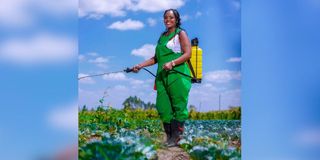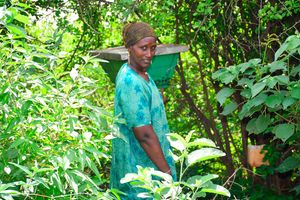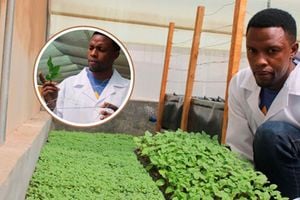
Wangari Kuria is the founder of Farmer on Fire Ltd, an organisation that provides end-to-end support for smallholder farmers in Africa.
As towns are established and others expand, there is need for local solutions to food production. Urban farming has emerged as a solution, with town dwellers transforming backyards into gardens.
Wangari Kuria, aka “Farmer on Fire”, is an agrifluencer and advocate for urban farming. She is on a mission to unlock the potential of agriculture in Africa.
Wangari is the founder of Farmer on Fire Ltd, a Nairobi-based organisation that provides end-to-end support for smallholder crop producers.
Through her platform, Wangari has built a thriving community of more than 100,000 farmers who follow her insights on agribusiness, innovation, and sustainability.
Wangari gives farmers valuable knowledge on tools, resources and expertise they need to thrive in the ever-evolving agricultural landscape. She does so on several online channels.
“My focus is small-scale farmers because I am a smallholder too. When we urge women and young people to get into agriculture, we forget that most do not have the necessary assets. This is why the training is important,” she says.
Wangari traces her passion for farming to Nyahururu, Laikipia County, a region that feeds neighbouring counties and Nairobi.
The fertile volcanic soils of Nyahururu support the cultivation of maize, beans, Irish potatoes, cabbages, spinach, sukuma wiki, carrots, peas and other crops.
After unexpectedly being retrenched from a real estate company, Wangari moved to Kitengela, Kajiado County.
With no viable income , Wangari recalled her mother’s kitchen garden and took the decision to create one for herself.
She reconnected with agriculture and ultimately launched a career as an agrifluencer and advocate for sustainable farming. She now helps smallholder farmers improve their livelihoods and grow in the face of economic and environmental challenges.

Wangari Kuria, the founder of Farmer on Fire Ltd, an organisation that provides end-to-end support for smallholder farmers in Africa.
Wangari observed that many of her neighbours had unused land as their focus was on livestock production.
She saw an opportunity in that and began asking if she could use some of their plots for crop production. Soon, Wangari recognised a gap in the market for indigenous vegetables.
“There was a excitement when people saw fresh produce grown around. Most vegetables consumed here were from other regions and highly perishable. The rising demand for the vegetables was enough motivation to expand the business,” she says.
The young woman then began sharing her experiences on social media. She initially started with a small kitchen garden, growing sukuma wiki and a few other vegetables.
Despite the dry land in Kitengela, Wangari saw potential for fresh produce. The high demand confirmed her belief.
She stresses the importance of digital presence for farmers.
“We are not going back to the analogue era. We live in a digital world and farmers in Kenya and the region in general need to embrace the change in order to thrive,” she says.
Through hands-on training, Wangari helps farmers face challenges, offering innovative solutions.
Wangari’s vision of a sustainable and inclusive farming is shaping the next generation of African agribusinesses.
She says Farmer on Fire Ltd promotes programmes like mushroom and insect farming, enabling communities to embrace alternative and regenerative agriculture.
“We train communities and individuals to grow mushrooms. This has helped promote resilience against climate change,” she says.
“This sustainable farming method offers a high-income crop, creates thousands of jobs and supports regenerative agriculture, which requires less water and less land. Regenerative agriculture produces less emissions than growing crops in the traditional way.”
Mushroom farming enhances soil health by rebuilding soil biodiversity and improving nutrient cycling, benefiting other crops in the surrounding areas, Wangari says.
Additionally, mushrooms offer a sustainable protein alternative, contributing to healthier communities and a healthy planet.
Farmer on Fire also uses Black Soldier Fly (BSF) larvae for organic feeding, composting and reducing greenhouse gas emissions.

Wangari Kuria sprays some of her vegetables.
Wangari says this approach lowers the cost of livestock production by providing an affordable alternative to traditional animal feed.
“BSF larvae technology helps address waste management by reducing landfill garbage and cutting down carbon emissions,” Wangari says.
“In addition to providing organic, nutrient-rich feed for animals, the technology serves as a natural pest control solution and contributes to regenerative agriculture by enriching the soil with nutrients.”
To address the challenges posed by limited land, Wangari has adapted farming techniques that are appropriate in densely populated urban areas.
One of her main programmes is giving farming knowledge to single mothers in pastoralist communities, who are particularly vulnerable to the impacts of global warming.
Her small model farms specialise in high-value crops like oyster, button mushrooms, strawberry and azolla.
Most of her harvest is dried using solar equipment before being packaged.
“I support them start mushroom ventures and provide guidance on finance, including table banking. This helps the farmers access the resources needed to grow their businesses,” Wangari says.
She offers online sessions and monthly on-farm training. The online training costs Sh5,000, while on-farm sessions are priced at Sh5,350.
Wangari also links established agribusinesses like Agra, John Deere, Google, PepsiCo, Heifer international, the Ministry of Agriculture and Livestock to her smallholder farmers community through digital channels.
She says she has trained more than 12,500 individuals online and 2,400 through on-farm sessions, equipping them with the knowledge and skills to succeed in small-scale farming.
Wangari’s work on agriculture and food security has earned her recognition. She has been recognised for her impact on communities as she provides valuable information on fighting hunger to farmers across Kenya and other countries.
Wangari is an advocate for women in agriculture and an author.
She has received several awards, including the 40 Under 40 Africa Award and the Global Citizen Prize.










